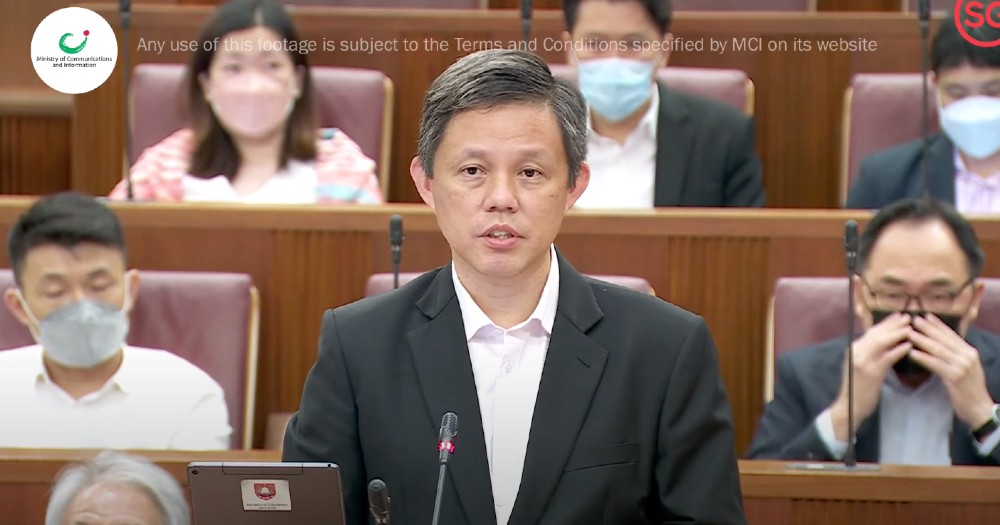Follow us on Telegram for the latest updates: https://t.me/mothershipsg
Parliament on Monday (May 9) agreed to raising the minimum fine for the disqualification of Members of Parliament (MP) from S$2,000 to S$10,000.
This amendment to Singapore's Constitution was unanimously agreed to by MPs in Parliament, making this the first time that the fine quantum was revised since independence.
Revision part of Elections Department's review after GE2020
Minister for Education and Minister-in-charge of Public Service Chan Chun Sing addressed potential questions from MPs on why the fine quantum was raised only now, and what had prompted this revision.
Chan explained that the proposal to raise the fine quantum, along with other changes to disqualification criteria, was made following a review by the Elections Department (ELD) after the 2020 General Election.
It was during this review that the ELD noted that the MP disqualification criteria had not been updated since independence, and therefore initiated a review of the criteria, Chan said.
Chan said that the ELD made two considerations in revising the fine quantum.
First, Chan said that the revised fine quantum took into account inflation, and that S$2,000 then would amount to about S$8,000 today.
Second, the revision took into account sentences handed down by the courts today for committing "serious tax evasion and corruption offences which are relevant to the integrity of a person", he added.
Chan said that the one-year jail term disqualification criteria was not changed, as it remains an "appropriate threshold" after ELD studied similar disqualification criteria in other Commonwealth countries.
Apart from the increase of the fine quantum, other amendments include expanding the disqualification criteria to convictions in any foreign country, and to remove an outdated clause which relates to disqualification when a person acquires foreign citizenship.
MPs: Specify offences that would lead to disqualification
People's Action Party (PAP) MPs Lim Biow Chuan and Murali Pillai both suggested that disqualifying MPs based on a minimum fine quantum may not be entirely appropriate.
They instead suggested that the Constitution specify which types of offences would lead to disqualification.
Murali cited examples of sentences handed to Singaporean men convicted of various sexual offences, such as possessing child sexual abuse materials and molest. In these cases, Murali pointed out that the men had received jail sentences of less than a year.
"If an MP were to have committed any one of these offences, he would not be automatically disqualified," he said.
He also pointed out how for other professions, the civil service and for uniformed officers, committing a crime would often lead to a demotion, punishment or a dismissal.
He argued that an MP should be held to similar requirements.
Meanwhile, Lim suggested that a person be disqualified from being an MP if that person is convicted of an offence "that relates to dishonesty, fraud, corruption" or as Murali pointed out, sexual misconduct.
"We should amend the Constitution to ensure that the type of people who are disqualified from becoming Members of Parliament are the ones that we want to exclude, and not citizens who have made minor or technical mistakes in their lives," he added.
Workers' Party (WP) MP Sylvia Lim said that while she supports the amendments, she questioned whether fines should be relevant at all for an MP's disqualification in Parliament.
She explained that fines or jail terms may be imposed by the courts on many offences with "varied moral culpability, ranging from traffic offences to theft".
She also pointed out how fines can be imposed for certain offences that "many do not consider criminal in nature".
She cited the example of Singapore Democratic Party John Tan, who was fined S$5,000 in 2019 for contempt of court and was therefore unable to contest in the 2020 General Election.
Chan Chun Sing: Participation in public office should be as "unfettered" as possible
In response to the MPs' suggestions, Chan said that the scope of the bill was made "intentionally narrow" and focused on updating the disqualification criteria.
"This is in keeping with the democratic ideal that the rights of individuals to participate in the political process and to stand for public office should be unfettered as far as possible," Chan said.
He added that while there is a need to ensure the fitness of parliamentarians, the bar cannot be set so high that it undermines Singapore's parliamentary system which is based on representative democracy.
He said that keeping the disqualification criteria to a "reasonable threshold" also allows voters "broad discretion" in whom they wish to represent them.
Chan also cited challenges of listing specific offences under disqualification criteria, as this might involve having to "frequently amend a basic document like the Constitution".
He said the disqualification criteria set forth in the bill "simply sets the minimum threshold" for those seeking office in Parliament, and ensures "basic fitness" for office.
Beyond the disqualification criteria, Chan said that political parties must continue to ensure that the candidates they field and MPs from their parties are "persons with integrity" and "who adhere to the highest standards of conduct".
Ultimately, Chan said, it is the voters who will decide at the ballot box the fitness of the person seeking to represent them in Parliament.
Follow and listen to our podcast here
Top photo via MCI/YouTube
If you like what you read, follow us on Facebook, Instagram, Twitter and Telegram to get the latest updates.
